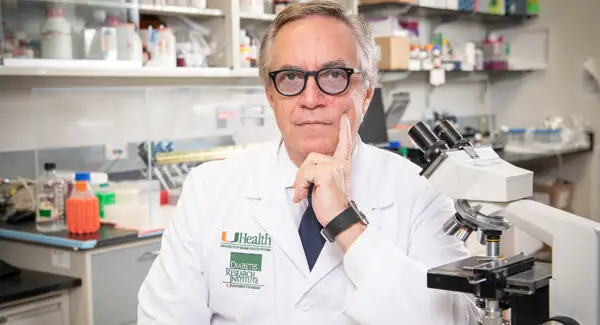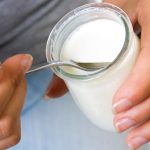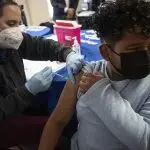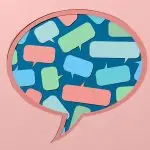How shut are we to a remedy for kind 1 diabetes? Who is best positioned to know that than Camilo Ricordi, MD, director emeritus of the Miami Diabetes Institute?
The diabetes neighborhood is understandably skeptical of specialists who promise a remedy can be discovered within the close to future, however we have been listening to it for many years. However the reality is that researchers are making actual progress (albeit slowly), and the variety of experiments being carried out immediately may present the important thing to the holy grail of diabetes analysis.
Dr. Ricordi has accomplished a lot of the foundational work to get us to the place we’re immediately. He presently holds a singular place on the Diabetes Analysis Institute (DRI), serving to lead a number of the world’s most enjoyable medical trials in diabetes. One such trial is nearly sure to be essentially the most eagerly awaited experiment on this planet of diabetes. It is a new take a look at from Vertex Prescribed drugs of lab-grown islet cells which might be bodily protected against the immune system.
Whereas the science may be very attention-grabbing, the fact of attaining a remedy could be miserable. Ricordi believes we’re just a few years away from a real experimentally confirmed therapy for kind 1 diabetes, however even this most optimistic situation is fraught with regulatory and financial challenges. There may be. We do not know what number of years it is going to take to get a therapy out of the lab and into the our bodies of individuals with diabetes, or how a lot it is going to value.
Obstacles apart, Ricordi and DRI stay dedicated to discovering a remedy for kind 1 diabetes. This is what he needed to inform us:
What’s the definition of therapy for kind 1 diabetes?
There are a lot of competing definitions of “cures” for kind 1 diabetes.
For instance, somebody may say {that a} pancreas transplant can remedy T1D. In spite of everything, in some circumstances, a pancreas transplant can fully restore wholesome insulin manufacturing, permitting sufferers to eat no matter they need with out the usage of insulin. Nevertheless, it entails vital prices, suppressive administration of immunosuppressive medicine with extreme unwanted side effects, and finally a excessive likelihood of failure. In the meantime, some biotech firms are specializing in “useful therapies” that mix drugs and expertise to permit T1D sufferers to stay fully regular lives with out altering the underlying physiology of the illness. I’m doing it.
Ricordi desires one thing higher, an actual remedy, to eradicate kind 1 diabetes and guarantee it by no means comes again.
“My definition of remedy is that it may exchange the organic endocrine operate of the pancreas that has been selectively destroyed by an autoimmune response, and that it may exchange anti-rejection medicine and different poisonous interventions that may trigger issues. You are able to do it with out utilizing it. You may’t exchange diabetes with one other illness.”
“However my motto is ‘There is no such thing as a remedy with out prevention,’ so my definition goes past that. The second we discover a profitable cell remedy, we are able to stop the recurrence of the illness and forestall accelerated getting old and disease-related illnesses.” We have to work on stopping continual problems.”
“The (therapies) you might be setting up to stop the illness from coming again might be able to stop the illness within the first place. It is a 360-degree intervention: main prevention, curing sufferers who’ve been recognized, and managing the illness. That is to stop recurrence, accelerated getting old, and different problems.”
How shut are we to therapeutic?
Ricordi is aware of that folks within the diabetes neighborhood are bored with listening to {that a} remedy will take “5 years.” As way back as 1984, Ricordi mentioned, his colleagues shoved him on a airplane from Milan to america and mentioned, “We have found a remedy with islet transplants, and we have to convey it again to Europe.” However there was nonetheless a long time of labor to be accomplished.
In 1988, Ricordi developed an automatic islet isolation technique that made it potential to carry out islet transplantation. In 1990, he helped present that insulin manufacturing might be restored in individuals with out a pancreas by means of islet transplantation. In 1999, the Edmonton Protocol did one thing comparable for sufferers with autoimmune kind 1 diabetes. In 2021, Vertex achieved success with laboratory-grown islet cells, opening new prospects for a limiteless provide of wholesome islets for transplantation.
“It has been a protracted street, however we’re now engaged on the final half: tolerance induction and illness recurrence. That provides me nice hope…The event of a proof-of-concept for a therapy relies on quite a few components. This might be accomplished inside 5 years or it may take greater than 15 years.
Ricordi warns that even when a real therapy is confirmed below experimental circumstances within the subsequent few years, “it is going to take 5 years to observe up on the primary group.” If that occurs, it is going to take extra time to scale up the therapy and make it broadly obtainable.
“The timing of implementation for all kind 1 diabetics is one other subject. We do not wish to create false hope.”
However when colleagues up to now have introduced, maybe overly enthusiastically, how shut we’re to a remedy, he has defended himself:
“I do not suppose it is simply hype. As a result of for those who do not imagine that any of those trials or protocols or methods could make a distinction, why do you do it? As if the following As we flip the nook, I believe it is necessary to maintain our group’s focus and enthusiasm on the remedy, recognizing that it could take one other decade or extra.”
Immunosuppression points
In June, we realized that two of our early Vertex sufferers at the moment are fully insulin impartial. “Displaying that stem cell-derived islets exist was an unbelievable breakthrough. can “It improves diabetes and induces long-term insulin independence,” Ricordi says.
However Vertex’s first profitable T1D therapy, a transplant of lab-grown islet cells, nonetheless requires the usage of immunosuppressants. These medicine carry severe dangers, together with most cancers and life-threatening infections.
To make issues worse, the primary anti-rejection drug utilized in islet transplants, Prograf (tacrolimus), is definitely poisonous to the cells it’s defending. In some circumstances, the drug may even trigger diabetes. This toxicity helps clarify why most islet transplants finally fail in the long run.
“The last word aim is to do these transplants with out immunosuppression,” Ricordi says.
Finest Likelihood for Therapeutic: VX-264
Probably the most thrilling analysis presently being carried out on the Diabetes Analysis Institute is attempting to just do that. Ricordi helps conduct the primary human medical trial of Vertex’s newest remedy, VX-264, which encapsulates transplanted islet cells and protects them from the immune system with a bodily barrier. The gadget is a results of “superb engineering and nanotechnology,” Ricordi mentioned. DRI can be one in all a number of areas in a number of nations implementing this modern initiative.
The Diabetes Institute is presently enrolling for the VX-264 trial and alluring a number of courageous and doubtlessly very fortunate sufferers to take an opportunity on what might be a milestone within the race to remedy diabetes. looking for out.
If all goes in accordance with plan, the primary affected person will obtain the transplant quickly. They are going to be given partial doses of islet cells, and preliminary outcomes can be evaluated primarily for security moderately than efficacy. The trial is predicted to conclude in Might 2026, however early outcomes will doubtless be obtainable by then.

diabetes analysis institute
Different thrilling trials
DRI is certainly not placing all its eggs in a single basket. Vertex is only one method, and it has not but been profitable. Even whether it is efficient, it is probably not the best therapy for everybody with kind 1 diabetes.
“Vertex is unquestionably on pole place, however we cannot know who will win till the race is full,” Ricordi says. “I imagine together methods. I do not know if there’s a single bullet that can be one hundred pc profitable for everybody.”
Ricordi highlighted two different notably attention-grabbing trials supported by DRI. Each concentrate on what Ricordi calls the “final piece” of the therapy puzzle: immunosuppression.
The primary is the dream of a biotech startup referred to as iTolerance, which is working to develop microgels that may be blended with islet cells earlier than transplantation. This substance could cause the T cells that assault the brand new islets to self-destruct. You can even retrain your immune system to privilege that space, permitting islet cells to do their job unhindered. The result’s native immune tolerance, which “tips the immune system into accepting the transplanted organ as if it had been its personal cells.” And it may all work with out basic immunosuppression.
“We’re very joyful that we even have a non-device-based method for tolerance induction,” Ricordi says. Right now, we have no idea whether or not bodily immune system boundaries like Vertex will work, both initially or long-term. ViaCyte, a former Vertex competitor, clearly believes the bodily encapsulation experiment has failed.
Ricordi is equally excited a few trial testing an anti-rejection drug that might be considerably higher than Prograf, a “costimulation blocking molecule” developed by Eledon Prescribed drugs. This drug, in contrast to Prograf, is just not diabetic in any means. Riccordi mentioned early research present the drug “triples insulin manufacturing from transplanted islets.”
Even when it had been discovered to be an enchancment over Prograf, it would not precisely be a remedy, however it might be an “unbelievable step ahead,” Ricordi says. This might make islet transplantation safer and longer lasting, doubtlessly making the process a viable choice for extra sufferers. “Maybe this might be a key part of tolerance induction protocols to finally full drug-free islet transplantation.”
In fact, different trials not involving the Diabetes Institute are ongoing world wide. DiogenX, for instance, is engaged on an artificial protein that might trigger new beta cells to develop within the pancreas. ViaCyte, acquired by Vertex, laid the muse for gene-edited islet cells to evade the immune system. That is one other avenue that Vertex can discover.
A few of these completely different methods might finally be mixed to kind a definitive therapy. For instance, Ricordi is considerably doubtful about islet cells gene-edited for “whole stealth.” However he believes lighter-touch gene modifying “may play an enormous position sooner or later.” Making cells much less immunogenic might facilitate the induction of immune tolerance to those islets. ”
How a lot does it value to deal with kind 1 diabetes?
“Everybody asks when there can be a remedy, however I additionally surprise who will be capable of afford it. We have to hold issues as nonprofit as potential.”
Ricordi defined that in Europe, governments approve medicine and costs on the similar time. “However in america, as soon as the FDA approves a drug, it turns into the Wild West.”
“Superior cell therapies can value a whole lot of hundreds of {dollars}. Whether or not they’re economically sustainable is questionable.”
Ricordi works carefully with Vertex on testing therapies, however is totally separate from the group that determines pricing for authorized therapies. Vertex has spent nicely over $1 billion buying and growing experimental therapies, and could have a robust incentive to cost excessive costs for therapies which might be accepted as miracles.
Will Vertex cost an arm and a leg to deal with Kind 1 diabetes? Ricordi can solely say, “I hope not, however I do not know.”
DRI choice
It was a dedication to a trigger that introduced Ricordi to Miami within the first place. Within the early Nineties, Ricordi discovered himself receiving a flood of recruiting gives from a number of establishments, however turned down large universities like Harvard in favor of the Diabetes Institute.
“I selected DRI as a result of it gives one thing distinctive that enables me to remain targeted on discovering a remedy for kind 1 diabetes. , this has been my lifelong skilled mission ever since my little cousin was recognized with Kind 1.”
Though Dr. Ricordi not too long ago stepped down as scientific director, he stays closely concerned in ongoing analysis. A brand new director, Matthias von Hellas, MD, has been appointed. Dr. von Heras, a world skilled in diabetes and immunology, has no intention of fixing the group’s mission.
“This constructing should stay devoted to discovering a remedy for diabetes.”
Ricordi has demonstrated this dedication all through his profession. When he invented a brand new course of for isolating islet cells (a way presently used for islet transplantation world wide), he put all of his mental property behind him to make sure that it might be disseminated as shortly as potential. Printed. When scientists be a part of the Diabetes Analysis Institute, they’re requested to undertake comparable efforts.
“In case you work at DRI, you will need to pledge that you’re not right here to maintain secrets and techniques. You should collaborate, share, and assist others. We assist individuals world wide who assist us attain a remedy within the quickest and best means potential.”
(translate tag) beta cell









